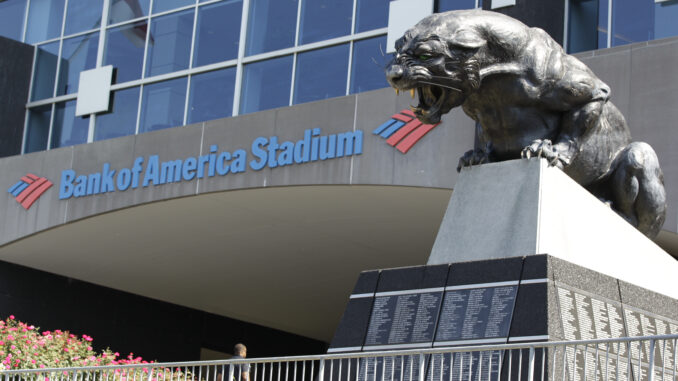
CHARLOTTE — The Carolina Panthers and the City of Charlotte have proposed a partnership deal that would include an $800 million renovation to Bank of America Stadium and keep the NFL team here for 20 years.
The renovation would include a fixed $650 million investment from the city and another $150 million from Panthers owner David Tepper. The owner’s money would go toward the renovation and potential overages.
Tepper has already invested more than $117 million in the stadium prior to June and would also pay another $421 million for capital improvements over the term of the deal, the team said in a news release.
The city’s investment does not require any new or increased taxes. According to the release, it would be funded by existing hospitality and tourism taxes, “which are legally required by the state to be spent on projects to support the city’s tourism economy. The restricted funds cannot be used for other city functions like transit, education, affordable housing or public safety.”
The tax, which adds a 1% surcharge on prepared food and drinks — restaurant meals, bar tabs, etc. — was extended for an additional 26 years in a vote by lawmakers last October. It now expires in 2060.
Charlotte City Council members are expected to meet over the next several weeks to discuss the Bank of America Stadium renovation project.
“Bank of America Stadium has been a special place for our Panthers, and now Charlotte FC, fans for nearly 30 years,” Panthers team president Kristi Coleman said in the release. “While Bank of America Stadium has solid infrastructure, investments are needed to ensure that our decades-old venue continues to deliver the best experience for our players, fans, and community.”
The city’s share would be funded by existing hospitality and tourism tax resources, which are legally required by the state to be spent on projects to support the city’s tourism economy.
“This renovation is about modernizing the stadium to deliver elevated experiences while preserving the overall character and location that fans have known and loved for decades,” Coleman said.
Bank of America Stadium opened in 1996. At the time, it’s construction costs of approximately $248 million were funded privately, with sales of personal seat licenses to season ticketholders as a major source of funding. The main contributions from the city of Charlotte and Mecklenburg County at the time were providing the land, by way of a $1 a year lease, and providing assistance in environmental cleanup and moving of existing buildings before construction began. These contributions were estimated between $50 million and $60 million.
The enhancements will include upgraded video and audio systems, modernized infrastructure, redesigned concourses, unique social areas with skyline views, and exterior spaces for community gatherings and programming.
“Imagine entering the stadium through an inviting perimeter with a park-like setting,” the team release stated, “and exterior video boards for watch parties and other viewing opportunities.”
Other important elements include new seating installed throughout the bowl, improved accessibility throughout the facility, designed and constructed in a way that allows individuals with a range of disabilities to have access without barriers. Restrooms would also be upgraded, and the stadium improvements would reduce its impact on the environment and Charlotte infrastructure by modernizing plumbing, electric and HVAC systems.
The south lawn pavilion area would be reimagined as a community gathering spot and outdoor classroom on game days and non-event days.
The team suggested improvements to concessions available at the stadium, including more regional offerings. The plan also includes an expansion of the Team Store, as well as art and culture elements included in the stadium design, “to reflect the vibrant culture across the Carolinas.”
“Today was a first step in what will be a series of conversations with public officials,” Coleman said. “Our goal is to build a collaborative partnership so that this community asset can continue to generate unique and memorable experiences for fans, as well as economic impact for the city and region for years to come.”
The stadium also serves as home for Major League Soccer’s Charlotte FC and regularly plays host to college football games and concerts.
“Bank of America Stadium provides our Club one of the best home pitch advantages in Major League Soccer,” Charlotte FC president Joe LaBue said. “It also serves as a pillar of our community that supports our mission to be a unifying force in the city.”
Last year, Charlotte city leaders were presented with a proposal for a new stadium to replace Bank of America Stadium. That project had a price tag of $1.2 billion, with $600 million coming from public funding.
NSJ Staff contributed to this report



